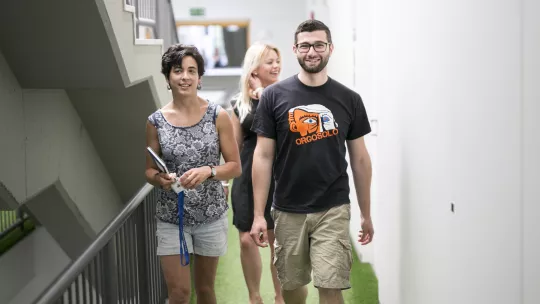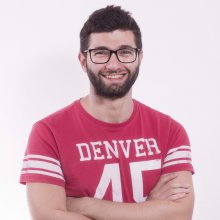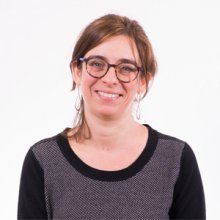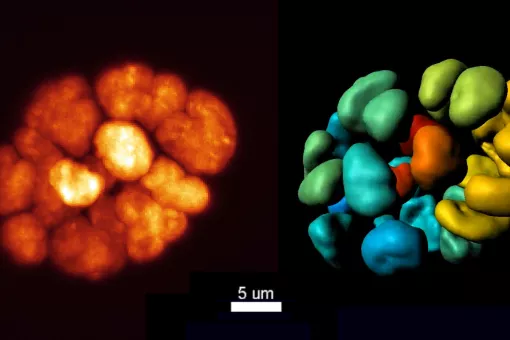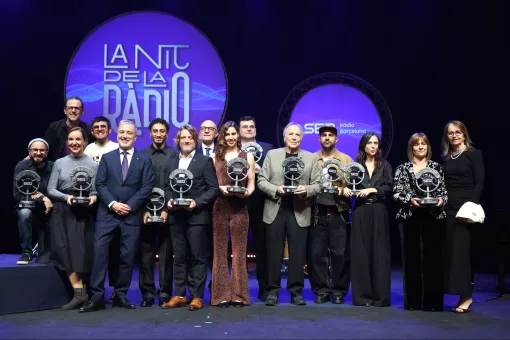Images
To foster the next generation of scientific leaders, IRB Barcelona kicks off the international symposium series ENABLE, part of the Horizon 2020 Programme, for young researchers working in the Life Sciences.
Involving scientific debates, career sessions, and outreach activities, these 3-day symposia are jointly coordinated by young students from four European centres.
After first event in Barcelona in 2017, the ENABLE symposia will be held in Copenhagen in 2018, Nijmegen in 2019, and Milan in 2020.
In November 2017, Barcelona will be the first European city to host the 300 young international biomedical researchers, mostly PhD students, who will be participating in the inaugural ENABLE symposium, an initiative promoted by the Institute for Research in Biomedicine (IRB Barcelona). This project was awarded 500,000 euros through the “Celebrating European Science” section of the EU’s Horizon 2020 Programme. The event in Barcelona will be the first of four yearly gatherings, the last one to be held in 2020, that seek to train the next generation of leading biomedical scientists in Europe.
Today marks the kick off at IRB Barcelona to plan the first symposium together with representatives from the other research centres involved, namely the Radboud Institute for Molecular Life Sciences (RIMLS) in Nijmegen (the Netherlands), The Novo Nordisk Foundation Center for Protein Research (CPR) in Copenhagen (Denmark), and the Scuola Europea di Medicina Molecolare (SEMM) in Milan (Italy). The fifth member of the ENABLE project is Scienseed, a company in Madrid that specialises in science communication.
The uniqueness of the ENABLE symposia is explained by two novel characteristics: they are organised entirely by young scientists from the four research centres and they cover three basic aspects for the careers of these young people, namely the discussion of cutting-edge research, the promotion of career development in science, and science outreach activities for schools and the public at large.
The first symposium in Barcelona, entitled “Breaking down complexity: innovative models and techniques in biomedicine”, will be held from 15 to 17 November next year. The Scientific Organising Committee, comprising 12 young students from the four centres, are already working on the eight talks by renowned international scientists. Meanwhile, the Local Organising Committee, formed by 14 PhD students at IRB Barcelona, in coordination with the Scientific, will be devoted to various tasks, such as venue, sponsorship issues, budget management, communications, school and general public outreach activities, a scientific career and employment fair, and an art and science exhibition.
“As its name says, ENABLE aims to empower young scientists. In this regard, it seeks to give them the skills they need for a successful scientific career, which includes achieving excellence in the research they undertake but also experience in what are called “soft skills”. These include things like conference planning in collaboration with foreign colleagues, budget management, searching for funding sources and knowing how to communicate to scientific and non-scientific audiences alike,” explains Clara Caminal, from IRB Barcelona, coordinator of the symposia.
The Barcelona symposium in 2017 will be followed by one in Copenhagen (Denmark) in 2018, in Nijmegen (the Netherlands) in 2019, and in Milan (Italy) in 2020. The ultimate goal of ENABLE is to establish a sustainable network of young scientists beyond 2020 and to build the foundation for dialogue with society.
Previous PRESS RELEASE: Europe backs its future leaders in biomedicine (July 2016)
Check out ENABLE site: http://enablenetwork.eu/
About IRB Barcelona
The Institute for Research in Biomedicine (IRB Barcelona) pursues a society free of disease. To this end, it conducts multidisciplinary research of excellence to cure cancer and other diseases linked to ageing. It establishes technology transfer agreements with the pharmaceutical industry and major hospitals to bring research results closer to society, and organises a range of science outreach activities to engage the public in an open dialogue. IRB Barcelona is an international centre that hosts 400 researchers and more than 30 nationalities. Recognised as a Severo Ochoa Centre of Excellence since 2011, IRB Barcelona is a CERCA centre and member of the Barcelona Institute of Science and Technology (BIST).

